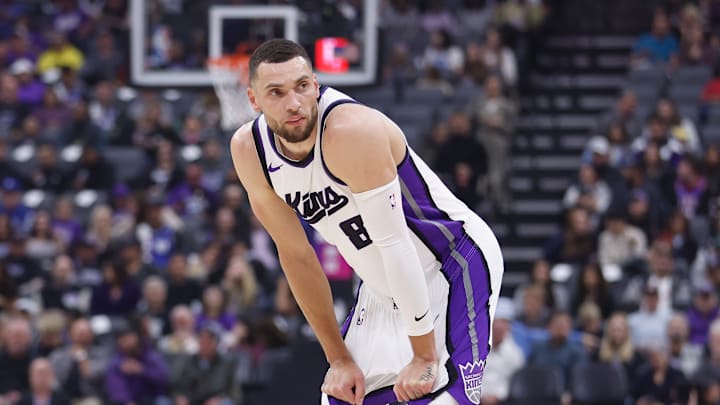After prompting a trade request and urging the Chicago Bulls' front office to consider options for his departure, there was a period when two-time NBA All-Star Zach LaVine identified the Miami Heat as one of his top trade destinations. Despite this, discussions didn't culminate in a trade, as LaVine's market value declined due to his substantial contract and ongoing health issues.
Before being traded to the Sacramento Kings from the Bulls during this year's NBA trade deadline, LaVine had a strong final season with Chicago, boosting his trade value by delivering one of the most productive performances of his career. Ranking third in franchise history for scoring average, he recorded averages of 24 points, 4.8 rebounds, 4.4 assists while shooting 51.5% overall and 45.5% from beyond the arc.
Miami's front office has been looking for another All-Star to join the team for quite some time. While the Heat aren’t interested in trading Tyler Herro, the prospect of pursuing LaVine again to complement him and others on the roster could be appealing. LaVine's current team has faced many challenges this year in the form of coaching and roster changes, and losses marked by a struggling offense.
Currently, the Kings sit in ninth place in the Western Conference, finding themselves facing the Dallas Mavericks in the first round of the Play-In Tournament. As Sacramento is unlikely to emerge as a serious contender this season, it has left LaVine frustrated. Could grievances regarding performance and lack of winning push LaVine back into the mix for Miami as a potential trade target?
Drama in the NBA Western Conference
Following the discussion on the Bulls' choice to trade LaVine, in his article written for The Athletic titled "What I'm hearing on Zach LaVine, Jimmy Butler and more notes from around the NBA," reporter Sam Amick discloses that he heard that the Golden State Warriors' organization initially sought to trade for LaVine alongside Nikola Vučević while he was still with Chicago.
It is no secret that Golden State needed additional scoring options before acquiring former Heat small forward Jimmy Butler. When the Warriors' organization looked to bring potential talent to accompany Steph Curry, they considered LaVine as a "safer option" than Butler due to his youth, lower cost, and potentially better fit for the team's requirements.
However, those negotiations collapsed, prompting the Warriors to engage in discussions with Miami for Butler instead. While LaVine is a talented three-level scorer, it seems that he wouldn't fit seamlessly into the Golden State's system as previously thought.
While LaVine's role in Golden State would have possibly differed from his current situation in Sacramento, the criticism surrounding LaVine is that he's starting to lose the prime athleticism that allowed him to excel with Chicago. Although LaVine is still averaging 20+ points this season, which doesn't indicate signs of him negatively impacting the team he's on.
While the Kings' previous failure to secure a deal with the Bulls for LaVine seven years ago seemed like a significant misstep, the Warriors' successful acquisition of Butler has changed the narrative regarding the team's trade strategies and the integration of LaVine.
The pros and cons of LaVine for the Heat
The idea of the Heat acquiring the shooting guard from the Kings has its pros and cons. LaVine is a formidable player on offense, who could introduce a level of scoring diversity that is presently missing from the Heat's roster. He has learned to adapt to different schemes and situations, giving him the ability to contribute in various ways.
LaVine's proficiency in scoring outweighs his athleticism, and his ability to score from various positions on the court would enhance Miami's offensive capabilities alongside Tyler Herro and Bam Adebayo. He can also effectively stretch opposing defenses, creating more opportunities for his teammates with ample space to operate.
Furthermore, LaVine may complement the Heat's strategy of achieving success during the regular season while remaining competitive in the playoff race. The offensive capabilities, combined with the Heat's established defensive identity led by Adebayo, could make the Kings' star a synergistic fit.
On the other hand, in any trade pursuit of a high-salaried player, it doesn't come without contract negotiations and challenges. LaVine's substantial expiring contract would facilitate the creation of salary cap space and financial flexibility for the Heat. However, if LaVine chooses free agency instead of exercising his $49 million player option for the 2026-27 season, it could complicate potential discussions for teams wanting him, despite his increased trade value.
LaVine speaks out
Chicago seemed to improve and be on an upward trajectory. Their offensive success was bolstered by LaVine, Vučević, Lonzo Ball, and DeMar DeRozan, but things changed as they do in this league. After years of trade speculation, LaVine's tenure with the Bulls ended at the Feb. 2025 trade deadline when he was acquired by the Sacramento Kings.
Ironically, LaVine is experiencing Déjà vu as he faces similar challenges on his new team, considering the current composition of the Kings' roster. LaVine recently made headlines again for expressing dissatisfaction with how they are fairing this season.
“The vibe is not good. It shouldn’t be,” LaVine said in a recent postgame press conference following the Kings' loss to the Celtics. “We’re not happy with the way that we’ve been performing, individually and as a group. The games aren’t going to stop… so, you figure out how to get a win. We’re playing good spurts, obviously, but that doesn’t win you a game. So, we know we understand the standings, but we still take it one game at a time to figure out how to get one. We’re too far ahead in that because if you do that, you’ll just keep snowballing where we are.”
It's hoped that LaVine's recent remarks may offer some motivation to the Kings as they work to overcome their challenges. If given the option, could LaVine help Miami become formidable title contenders in the future?
